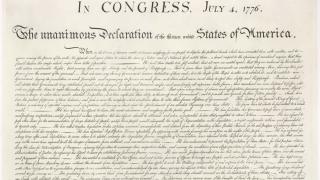July 3—As the United States (or at least some in the United States) celebrate Independence Day, it is worth reflecting on what is meant by “life, liberty, and the pursuit of happiness.”
Lyndon LaRouche explained the idea behind the American republic in a January 2006 discussion with youth in California: "[T]he intention of the Declaration of Independence, which is clear in what it says, contains one formula, which is crucial for all U.S. Constitutional law and conception of law, as opposed to the garbage which has been popularized in recent periods, by all kinds of renegades and confused idiots and whatnot. And that is, the principle of the General Welfare.
“Now, the General Welfare principle, which is the issue of—the recent, first Encyclical of Benedict XVI, is on the General Welfare, on agapē, which is a conception which is elaborated as a kernel of the concept of the republic, in Plato’s Republic And it comes out, especially out of the mouth of Socrates against Thrasymachus and Glaucon, who are alternative conceptions of government. So you have three conceptions: Thrasymachus, which is the concept of the Federalist Society! In other words, this is the thing which is denounced, and exposed as a horror-show, by Plato in the Republic: the Republic which is the document, which is a document of reference for the composition of the Constitution of the United States.”
He continued, saying that in crafting the Declaration of Independence, "they take a phrase directly from Leibniz’s attack on Locke, in the New Essays on Human Understanding of Leibniz. Which was a key reference point for the Americans, and especially for Franklin, in forming the United States.
“Now, the term is ‘the pursuit of happiness.’ Now, the ‘pursuit of happiness,’ pertains not to greed, or not to utilitarian notions, but rather to the fact that we are all mortal individuals—we die. We all die. Therefore, do we die as animals, or do we die as something else? And this distinction is located, where? And Leibniz is clear on this, as Plato is: The difference between man and beast, lies in those creative powers, which I referenced again today, in terms of the ability to discover a universal physical principle, or to discover the same distinct kind of idea, in the form of, shall we say, Furtwängler’s concept of ‘performing between the notes’ …
“So, this idea of creativity, as a distinction between man and the beast, is the meaning of ‘happiness.’ That is, we’re all going to die, so therefore, how can we take pleasure out of the fact that we’re going to die? We can only take pleasure out of the fact we’re going to die, when what we’re doing while we’re alive, somehow has permanent value for society: that we will live in the future, in that way, and practically, as our ancestors, our predecessors, who made discoveries of principle we share, live in us. So therefore, the right to have a life, while we live, which is a fulfillment of that which makes us human, rather than monkeys, is the ‘pursuit of happiness’—the right to development, in a sense. The right to education: This was a big issue! As for the question of slaves—it was illegal—you could be killed, as a crime against the local state, for allowing a slave to become educated to read and write.
“This is the same issue raised in the Prometheus Bound, as the charge made by Zeus against Prometheus, for allowing people to know how to use fire. And the same thing, the principle of slavery was the stupidity factor: You can live, if you’re stupid. And then, when freedom came, then you had liberals in the United States who had been opposed to slavery, but who nonetheless said, ‘We must not over-educate the children of these ex-slaves.’ In other words, again, the same thing: Keep them stupid! And tell them, that their interest is to be stupid! To think stupid things! To eliminate ideas from their life—to be ‘in their nature,’ that is, stupid, uneducated. As against Frederick Douglass and all the freedom fighters, who said that the freedom and development of the mind is the first step to freedom of the body. If we don’t have freedom of the mind, freedom of the body is a tenuous thing, which you may lose very easily—because of your mutual stupidity.
“So therefore, the issue of ‘happiness,’ is the issue of the education and development of man: So that, while we have a mortal life, we have the prescience, that our life is immortal because it’s a vehicle for contributing something of immortal value from the past, from our own lives, into the future.
“And this is the notion of the General Welfare. This notion is not new. The notion is the principle of agapē, which is the central conception of the first Encyclical by the most recently installed Pope, Benedict XVI: the principle of agapē. Which is the principle of I Corinthians 13, for example. This is the principle.”
Faced by provocations and dangers around the globe, we must today look to this principle in guiding our deliberations and actions in forming a new security and development architecture for our planet!






